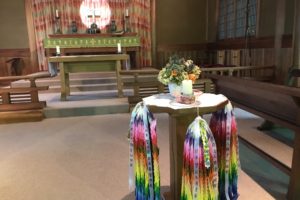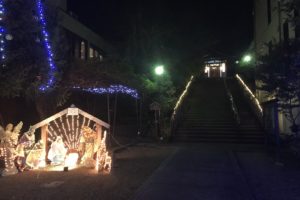May 19, 2024, Pentecost
Acts 2:1-21
Donald Seekins
I must confess that when I was reminded that today is Pentecost Sunday, I knew that the word Pentecost had some connection with Christianity but did not know exactly what it is. So, I looked in Wikipedia, the everyman’s encyclopaedia. What it told me was that Pentecost falls on the 50th day after Easter and commemorates the descent of the Holy Spirit upon Mary, Jesus’ mother, the Apostles and many other Jews from different parts of the world who happened to be congregating in Jerusalem to celebrate a Jewish festival. Because of differences between the Julian and Gregorian calendars, in 2024 western Christians celebrate Pentecost today, while our Russian, Greek, and Serbian friends in the east will celebrate it on June 23rd.
Our second reading for today, the account of the first Pentecost in the second chapter of Acts, is one of the most vivid episodes in the Bible. Imagine a crowded room, including Mary, Peter and the other Apostles, and many other people: “and suddenly a sound came from Heaven like the rush of a mighty wind, and it filled all the house where they were sitting. And there appeared to them tongues as of fire, distributed and resting on each one of them. And they were all filled with the Holy Spirit and began to speak in other tongues, as the Spirit gave them utterance.”
The account lists the different nationalities of the people at this first Pentecost: not only Galileans, who lived in what is now Israel-Palestine, but “Parthians and Medes, and Elamites and residents of Mesopotamia, Judea and Cappadocia, Pontus and Asia, Phrygia and Pamphylia, Egypt and the parts of Libya belonging to Cyrene, and visitors from Rome, both Jews and proselytes, Cretans and Arabians, we hear them telling in their own tongues the mighty words of God.” Parthians and Medes lived in what is now Iran, which at the time was under the rule of the Parthian Empire, a mortal enemy of the Roman Empire. Cappadocia, Pontus, Asia, Phrygia and Pamphylia were places that are now in Turkey, and Egypt and Libya are on the African continent. Egypt’s largest city at the time, Alexandria, was after Jerusalem the second city of the Jews who had a large and influential community inside the city. Arabs inhabited the Arabian Peninsula at a time when Arabic was not yet the lingua franca of the still unborn Islamic world. Not to mention people from Rome, and Crete, an island which is now part of Greece and was the cradle of the Minoan civilization that flourished long before Homer composed his Iliad. This was truly an international gathering.
What is most amazing is that this babble of disparate tongues was understood by everyone present: “and how is it that we hear, each of us in his own language?” It is not that all the people are speaking the local language, Galilean, but that their understanding of the different words they heard transcends differences in language.
People asked Peter what is going on. Are these people drunk off new wine? No, the Apostle replied. They are filled with the Holy Spirit. God has “poured” the Spirit into them, revealing prophecies and other mysterious knowledge in different tongues that everyone can both hear and comprehend.
The story of Pentecost brings closure to the story of the fall of the Tower of Babel in the Book of Genesis. In the very earliest days, the book tells us, “. . . the whole world had one language and few words.” To punish mankind’s arrogance in attempting to build a tower that would reach to Heaven, God said: “Come, let us go down and confuse their language, that they may not understand one another’s speech.” And He scattered them across the world (Genesis 11: 7-9). With Pentecost, the barrier of language – if only for a brief time – has been miraculously overcome.
The story of Pentecost is about the Holy Spirit, but also about language. The Holy Spirit is a part of the Trinity but often little understood by many Christians, including myself. Christianity, like other religions, has both a calm or tranquil and an ecstatic dimension: the philosopher Nietzsche, using Greek religion, called these the Apollonian and Dionysian elements that are totally opposite each other: the one calm, contemplative and rational while the other is passionate, chaotic and emotional – a kind of “creative intoxication.”
In Christianity, there are sects that focus on the Holy Spirit and express it through loud and often drunken-seeming devotions. While a student at a university in the southern U.S., my wife out of curiosity once went to a “Holy Rollers” service and was amazed at their devotions, how loud, gymnastic and emotional they were. In mainline denominations, church services are performed according to a precise Order of Worship and there is little room for this kind of emotional spontaneity, while services by the Pentecostals and Charismatic Christians are “wild”: their “speaking in tongues” or glossolalia, in fact, seems to be a re-enactment of the first Pentecost. The crucial difference, however, is that people at the first Pentecost were speaking real languages, while the Pentecostals are not.
Linguists have been interested in the practice of “speaking in tongues” or glossolalia for a long time. Their general conclusion is that the sounds made by Pentecostals and other charismatics are not a real language, but simply strings of sounds that have no coherent meaning, or no meaning at all. One linguist concluded that Pentecostal glossolalia is “meaningless but phonetically structured human utterance, believed by the speaker to be a real language but bearing no systematic resemblance to any natural language, living or dead.”
In my research on Burma, I have discovered that while Buddhism and Buddhist spaces are usually calm and tranquil, and Buddhist monks try hard not to be emotional, nat or spirit festivals can be wild, vulgar, even obscene, as the nat-medium communicates with these wild and unpredictable spirits, which are not unlike those encountered by Jesus in different parts of the New Testament. So, the contrast between Apollonian and Dionysian religion seems to be universal. We see the same contrast in Korean religion: between the calm rituals of Confucianism and ancestor worship and the wildness of the mudang, or shaman whose dance has become a symbol of Korean indigenous culture.
If we all spoke the same language, perhaps we would understand each other better. But I don’t think that is the message of Pentecost. What is important is in our hearts. Linguistic barriers can be overcome if the motivation is there. Ordinary people in Yangon often speak English better than college professors I know in Japan. That isn’t because English and Burmese are similar but because they find a knowledge of the language vital to their living their own lives.
Machine translation promises to overcome the barriers of language. Even now, emails written in Japanese on my computer magically turn themselves into English translations, although I don’t know how accurate they are. I suppose professional translators and interpreters will still be necessary in the scientific and business worlds, where the monetary stakes are high. The Japanese prime minister and American president will probably still use human interpreters rather than interacting through little black boxes. But in our glorious AI future, tourists may just wander around in foreign countries, holding little machines and machine-communicating with local people. Outside of our own linguistic bubble, the machine-translator will become as much a part of the 21st century human anatomy as smart phones are now.
However, I doubt that machine-translation will make people more cosmopolitan or open minded. It will just isolate people more from each other just as smart phones are doing now.
And a single language for all humanity would not eliminate war or the omnipresent Us versus Them mentality. After all, in Northern Ireland, the now-divided Yugoslavia and Israel-Palestine, people speak the same or very similar languages. America’s bloodiest war, the Civil War of 1861-1865, was fought by people who spoke English, though with different accents. The same or common language hasn’t guaranteed peace. In fact, the “sameness” of the Other often seems to generate more violence and extremism than an “exotic” Other. The bloodiest wars, it is said, are fought among brothers.













